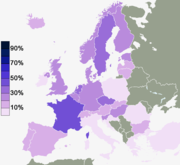Religion in Europe
| Religion by country |
|---|
|
|
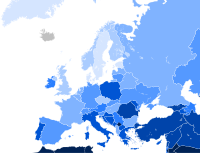

Religion has been a major influence on the societies,
Little is known about the
The
The
Religiosity

Some European countries have experienced a decline in church membership and church attendance.[6][7] A relevant example of this trend is Sweden where the Church of Sweden, previously the state-church until 2000, claimed to have 82.9% of the Swedish population as its flock in 2000. Surveys showed this had dropped to 72.9% by 2008[8] and to 56.4% by 2019.[9] Moreover, in the 2005 Eurobarometer survey 23%[10] of the Swedish population said that they do not believe there is any sort of spirit, God or life force and in the 2010 Eurobarometer survey 34%[2] said the same.
Gallup survey 2008–2009
This section needs to be updated. (June 2022) |
During 2008–2009, a
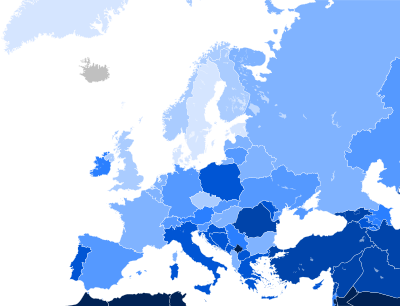
| 0%–9% | |
| 10%–19% (Estonia, Sweden, Denmark) | |
| 20%–29% (Norway, Czech Republic, United Kingdom, Finland) | |
| 30%–39% (France, Netherlands, Belgium, Bulgaria, Russia, Belarus, Luxembourg, Hungary, Albania, Latvia) | |
| 40%–49% (Germany, Switzerland, Lithuania, Kazakhstan, Ukraine, Slovenia, Slovakia, Spain) | |
| 50%–59% (Azerbaijan, Serbia, Ireland, Austria) | |
| 60%–69% | |
| 70%–79% (Croatia, Montenegro, Greece, Portugal, Italy, Poland, Cyprus, North Macedonia) | |
| 80%–89% (Turkey, Romania, Malta, Armenia, Moldova, Bosnia and Herzegovina) | |
| 90%–100% (Kosovo, Georgia) | |
| No data |
During 2007–2008, a
Eurobarometer survey 2010
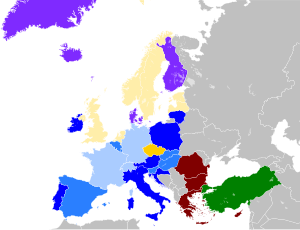
The 2010 Eurobarometer survey[2] found that, on average, 51% of the citizens of the EU member states state that they "believe there is a God", 26% "believe there is some sort of spirit or life force" while 20% "don't believe there is any sort of spirit, God or life force". 3% declined to answer. According to a recent study (Dogan, Mattei, Religious Beliefs in Europe: Factors of Accelerated Decline), 47% of French people declared themselves as agnostics in 2003. This situation is often called "
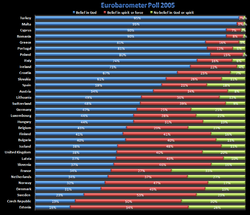
The following is a list of European countries ranked by religiosity, based on the rate of belief, according to the Eurobarometer survey 2010.[2] The 2010 Eurobarometer survey asked whether the person "believes there is a God", "believes there is some sort of spirit or life force", or "doesn't believe there is any sort of spirit, God or life force".
| Country | "I believe there is a God" |
"I believe there is some sort of spirit or life force" |
"I don't believe there is any sort of spirit, God or life force" |
|---|---|---|---|
| 94% | 4% | 2% | |
| 93% | 6% | 1% | |
| 88% | 8% | 3% | |
| 79% | 14% | 5% | |
| 79% | 16% | 4% | |
| 74% | 20% | 6% | |
| 70% | 20% | 7% | |
| 70% | 15% | 12% | |
| 63% | 23% | 13% | |
| 59% | 20% | 19% | |
| 47% | 37% | 12% | |
| 46% | 22% | 24% | |
| 45% | 34% | 20% | |
| 44% | 38% | 12% | |
| 44% | 25% | 27% | |
| 38% | 48% | 11% | |
United Kingdom
|
37% | 33% | 25% |
| 37% | 31% | 27% | |
| 36% | 43% | 15% | |
| 33% | 42% | 22% | |
| 32% | 36% | 26% | |
| 28% | 47% | 24% | |
Netherlands
|
28% | 39% | 30% |
| 27% | 27% | 40% | |
| 18% | 50% | 29% | |
| 18% | 45% | 34% | |
| 16% | 44% | 37% | |
| 51% | 26% | 20% | |
| 94% | 1% | 1% | |
joined EU in 2013 )
|
69% | 22% | 7% |
| 44% | 39% | 11% | |
| 31% | 49% | 18% | |
| 22% | 44% | 29% |
The decrease in theism is illustrated in the 1981 and 1999 according to the World Values Survey,[17] both for traditionally strongly theist countries (Spain: 86.8%:81.1%; Ireland 94.8%:93.7%) and for traditionally secular countries (Sweden: 51.9%:46.6%; France 61.8%:56.1%; Netherlands 65.3%:58.0%). Some countries nevertheless show increase of theism over the period, Italy 84.1%:87.8%, Denmark 57.8%:62.1%. For a comprehensive study on Europe, see Mattei Dogan's "Religious Beliefs in Europe: Factors of Accelerated Decline" in Research in the Social Scientific Study of Religion.
Eurobarometer survey 2019

According to the 2019
| Country | "Atheist" | "Non believer/Agnostic" | "Atheist + Non believer/Agnostic" |
|---|---|---|---|
| 2% | 2% | 4% | |
| 2% | 2% | 4% | |
| 3% | 4% | 7% | |
| 5% | 4% | 9% | |
| 3% | 6% | 9% | |
| 7% | 4% | 11% | |
| 6% | 5% | 11% | |
| 6% | 5% | 11% | |
| 4% | 8% | 12% | |
| 7% | 7% | 14% | |
| 5% | 9% | 14% | |
| 8% | 7% | 15% | |
| 4% | 12% | 16% | |
| 14% | 4% | 18% | |
| 6% | 13% | 19% | |
| 3% | 17% | 20% | |
| 9% | 13% | 22% | |
| 10% | 14% | 24% | |
| 10% | 16% | 26% | |
| 9% | 21% | 30% | |
| 10% | 21% | 31% | |
| 12% | 20% | 32% | |
United Kingdom
|
19% | 20% | 39% |
| 21% | 19% | 40% | |
| 21% | 27% | 48% | |
| 16% | 34% | 50% | |
Netherlands
|
11% | 41% | 52% |
| 22% | 34% | 56% | |
| 10% | 17% | 27% |
Maps
Pew Research Poll
According to the 2012 Global Religious Landscape survey by the Pew Research Center, 75.2% of the Europe residents are Christians, 18.2% are irreligious, atheist or agnostic, 5.9% are Muslims and 0.2% are Jews, 0.2% are Hindus, 0.2% are Buddhist, and 0.1% adhere to other religions.[21] According to the 2015 Religious Belief and National Belonging in Central and Eastern Europe survey by the Pew Research Center, 57.9% of the Central and Eastern Europeans identified as Orthodox Christians,[22] and according to a 2018 study by the Pew Research Center, 71.0% of Western Europeans identified as Christians, 24.0% identified as religiously unaffiliated and 5% identified as adhere to other religions.[23] According to the same study a large majority (83%) of those who were raised as Christians in Western Europe still identify as such, and the remainder mostly self-identify as religiously unaffiliated.[23]
Pew Research Poll
| Country | Affiliated Orthodox, Catholic or Muslim (poll 1) |
Unaffiliated (poll 1) |
Other/DK/ref (poll 1)* |
"Believe in God, absolutely certain" (poll 2)** |
"Believe in God, fairly certain" (poll 2)** |
"Believe in God, not too/at all certain" (poll 2)** |
"Do not believe in God" (Poll 2)** |
Atheist (poll 3)*** |
Agnostic (poll 3)*** |
Nothing in particular (poll 3)*** |
|---|---|---|---|---|---|---|---|---|---|---|
| 97 | 2 | 1 | 94 | 2 | 1 | 2 | 1 | 1 | ||
| 99 | <1 | 1 | 93 | 2 | 2 | 1 | <1 | |||
| 96 | 3 | 1 | 90 | 3 | 2 | 3 | 2 | 1 | ||
| 95 | 2 | 3 | 89 | 4 | 3 | 3 | 1 | 1 | ||
| 91 | 1 | 8 | 64 | 28 | 2 | 4 | 1 | |||
| 94 | 4 | 1 | 73 | 16 | 3 | 5 | 2 | 1 | 1 | |
| 90 | 7 | 3 | 72 | 14 | 5 | 5 | 4 | 2 | 1 | |
| 92 | 4 | 4 | 69 | 16 | 7 | 6 | 3 | 1 | ||
| 88 | 7 | 5 | 45 | 35 | 5 | 8 | 2 | 1 | 4 | |
| 78 | 6 | 17 | 34 | 34 | 7 | 11 | 2 | 4 | ||
| 88 | 7 | 5 | 32 | 45 | 6 | 9 | 3 | 4 | ||
| 91 | 5 | 4 | 30 | 40 | 7 | 17 | 2 | 1 | 2 | |
| 54 | 21 | 25 | 28 | 34 | 7 | 15 | 3 | 18 | ||
| 86 | 3 | 11 | 26 | 47 | 11 | 9 | 2 | 1 | ||
| 57 | 21 | 22 | 26 | 26 | 7 | 30 | 5 | 16 | ||
| 81 | 15 | 4 | 25 | 38 | 10 | 15 | 4 | 1 | 10 | |
| 22 | 72 | 6 | 13 | 13 | 3 | 66 | 25 | 1 | 46 | |
| 26 | 45 | 29 | 13 | 24 | 7 | 45 | 9 | 1 | 35 |
(*) 13% of respondents in Hungary identify as Presbyterian. In Estonia and Latvia, 20%
and 19%, respectively, identify as Lutherans. And in Lithuania, 14% say they are "just a
Christian" and do not specify a particular denomination. They are included in the "other"
category.
(**) Identified as "don't know/refused" from the "other/idk/ref" column are excluded from this statistic.
(***) Figures may not add to subtotals due to rounding.
| Country | A holy book (e.g. Bible) is written by men, not the word of God |
A holy book is the word of God |
|---|---|---|
9% |
88% | |
9% |
87% | |
10% |
87% | |
14% |
81% | |
18% |
76% | |
21% |
63% | |
24% |
61% | |
28% |
59% | |
28% |
58% | |
29% |
58% | |
30% |
58% | |
27% |
57% | |
41% |
43% | |
43% |
42% | |
41% |
41% | |
38% |
40% | |
58% |
26% | |
65% |
21% |
(**) Identified with answers "don't know/refused" are not shown.
Abrahamic religions
Bahá'í Faith

The first newspaper reference to the religious movement began with coverage of the
Starting in the 1890s Europeans began to convert to the religion. In 1910 Bahá'u'lláh's son and appointed successor,
A 1925 list of "leading local Bahá'í Centres" of Europe listed organized communities of many countries – the largest being in Germany.[30] However the religion was soon banned in a couple of countries: in 1937 Heinrich Himmler disbanded the Bahá'í Faith's institutions in Germany because of its 'international and pacifist tendencies'[31] and in Russia in 1938 "monstrous accusations" against Bahá'ís and a Soviet government policy of oppression of religion resulted in Bahá'í communities in 38 cities across Soviet territories ceasing to exist.[32] However the religion recovered in both countries. The religion has generally spread such that in recent years the Association of Religion Data Archives estimated the Bahá'ís in European countries to number in hundreds to tens of thousands.[33]
Christianity


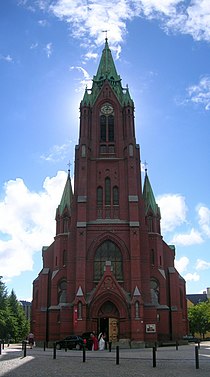
The majority of Europeans describe themselves as
Christianity is still the largest religion in
According to Scholars, in 2017, Europe's population was 77.8% Christian (up from 74.9% 1970),
Christian denominations
This article may contain an excessive amount of intricate detail that may interest only a particular audience. |
This article's factual accuracy is disputed. (December 2017) |
- Germanic Europe (which includes Austria, Luxembourg, northern Flemish Belgium, southern and western Germany, parts of the Netherlands, parts of Switzerland, and Liechtenstein).
- Orthodox Christianity (the churches are in full communion, i.e. the national churches are united in theological concept and part of the One, Holy, Catholic and Apostolic Eastern Orthodox Church)
- Ecumenical Patriarchate of Constantinople
- Russian Orthodox Church
- Serbian Orthodox Church
- Romanian Orthodox Church
- Church of Greece
- Bulgarian Orthodox Church
- Georgian Orthodox Church
- Finnish Orthodox Church
- Cypriot Orthodox Church
- Albanian Orthodox Church
- Polish Orthodox Church
- Church of the Czech Lands and Slovakia
- Ukrainian Orthodox Church
- Turkish Orthodox Church
- Macedonian Orthodox Church – Ohrid Archbishopric
- Montenegrin Orthodox Church
- Oriental Orthodoxy
- Protestantism
- Lutheranism
- Independent Evangelical-Lutheran Church
- Danish National Church
- Estonian Evangelical Lutheran Church
- Evangelical Lutheran Church of Finland
- United Protestant Church of France
- Protestant Church in Germany
- Evangelical-Lutheran Church in Hungary
- Evangelical Lutheran Church of Latvia
- Church of Norway
- Church of Sweden
- Anglicanism
- Calvinism
- Lutheranism
- Restorationism
- Other
- Baptist Union of Great Britain
- Baptist Union of Sweden
- Bruderhof Communities
- Seventh-day Adventist Church
There are numerous minor Protestant movements, including various Evangelical congregations.
Islam
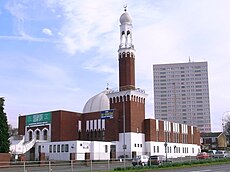
According to the
Muslims make up 99% of the population in
A survey conducted by the Pew Research Center in 2016 found that Muslims make up 4.9% of all of Europe's population.[79] According to a same study conversion does not add significantly to the growth of the Muslim population in Europe, with roughly 160,000 more people leaving Islam than converting into Islam between 2010 and 2016.[79]
Judaism
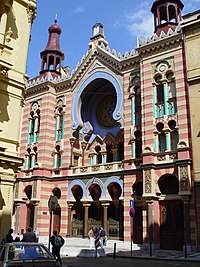
The Jews were
Deism
During the
Irreligion
The trend towards secularism during the 20th and 21st centuries has a number of reasons, depending on the individual country:
- laicist since the French Revolution. Today the country is 25%[86] to 32%[87] irreligious. The remaining population is made up evenly of both Christians and people who believe in a god or some form of spiritual life force, but are not involved in organized religion.[88]French society is still secular overall.
- Some parts of Eastern Europe were secularized as a matter of state doctrine under communist rule in the countries of the former Eastern Bloc. Albania was an officially (and constitutionally binding) atheist state from 1967 to 1991.[89] The countries where the most people reported no religious belief were France (33%), the Czech Republic (30%), Belgium (27%), Netherlands (27%), Estonia (26%), Germany (25%), Sweden (23%) and Luxembourg (22%).[90] The region of Eastern Germany, which was also under communist rule, is by far the least religious region in Europe.[91][92]Other post-communist countries, however, have seen the opposite effect, with religion being very important in countries such as Romania, Lithuania and Poland.
The trend towards secularism has been less pronounced in the traditionally
According to a
Atheism and agnosticism
During the late 20th and early 21st centuries, atheism and agnosticism have increased, with falling church attendance and membership in various European countries.[95] The 2010 Eurobarometer survey found that on total average, of the EU28 population, 51% "believe there is a God", 26% "believe there is some sort of spirit or life force", and 20% "don't believe there is any sort of spirit, God or life force".[2] Across the EU, belief was higher among women, increased with age, those with a strict upbringing, those with the lowest level of formal education and those leaning towards right-wing politics.[90]: 10–11 Results were varied widely between different countries.[2]
According to a survey measuring religious identification in the European Union in 2019 by Eurobarometer, 10% of EU citizens identify themselves as atheists.[18] As of May 2019[update], the top seven European countries with the most people who viewed themselves as atheists were Czech Republic (22%), France (21%), Sweden (16%), Estonia (15%), Slovenia (14%), Spain (12%) and Netherlands (11%).[18] 17% of EU citizens called themselves non-believers or agnostics and this percentage was the highest in Netherlands (41%), Czech Republic (34%), Sweden (34%), United Kingdom (28%), Estonia (23%), Germany (21%) and Spain (20%).[18]
Modern Paganism


Germanic
Heathenism or Esetroth (Icelandic: Ásatrú), and the organised form
In the
Ásatrúarfélagið (Esetroth Fellowship) was recognized as an official religion by the Icelandic government in 1973. For its first 20 years it was led by farmer and poet Sveinbjörn Beinteinsson. By 2003, it had 777 members,[98] and by 2014, it had 2,382 members, corresponding to 0.8% of Iceland's population.[99] In Iceland, Germanic religion has an impact larger than the number of its adherents.[100]
In Sweden, the
Roman
The
Druidry
The religious development of
Official religions
A number of countries in Europe have official religions, including Greece (Orthodox),[104] Liechtenstein,[105] Malta,[106] Monaco,[107] the Vatican City (Catholic);[108] Armenia (Apostolic Orthodoxy); Denmark,[109] Iceland[110][111] and the United Kingdom (England alone) (Anglican).[112] In Switzerland, some cantons are officially Catholic, others Reformed Protestant. Some Swiss villages even have their religion as well as the village name written on the signs at their entrances.
Indian religions
Buddhism
Buddhism is thinly spread throughout Europe, and the fastest growing religion in recent years[113][114] with about 3 million adherents.[115][116] In Kalmykia, Tibetan Buddhism is prevalent.[117]
Hinduism
Hinduism is mainly practised among Indian immigrants. It has been growing rapidly in recent years, notably in the United Kingdom, France, the Netherlands and Italy.[118] In 2010, there were an estimated 1.4 million Hindu adherents in Europe.[119]
Jainism
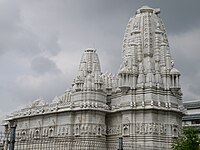
Jainism, small membership rolls, mainly among Indian immigrants in Belgium and the United Kingdom, as well as several converts from western and northern Europe.[120][121]
Sikhism
, have 5,000 or fewer Sikhs.Other religions
This article may contain an excessive amount of intricate detail that may interest only a particular audience. |
Other religions represented in Europe include:
- Animism
- Confucianism
- Eckankar
- Ietsism
- Raëlism
- Beliefs of the Romani people
- Romuva
- Satanism
- Shinto
- Spiritualism
- Taoism
- Thelema
- Unitarian Universalism
- Yazidism
- Zoroastrianism
- Rastafari communities in the United Kingdom, France, Spain, Portugal, Italy and elsewhere.
- , including
- West African Vodun and Haitian Vodou (Voodoo), mainly among West African and black Caribbean immigrants in the UK and France.
See also
- Buddhism by country
- Christianity in Europe
- Europeanism
- Hinduism by country
- Irreligion (no faith) by country
- Islam by country
- Judaism by country
- List of religious populations
- Major world religions
- Protestantism by country
- Post Christianity
- Religion in the European Union
- Roman Catholicism by country
References
- ^ a b "Europe". Encyclopædia Britannica. Retrieved 15 January 2016.
Most Europeans adhere to one of three broad divisions of Christianity: Roman Catholicism in the west and southwest, Protestantism in the north, and Eastern Orthodoxy in the east and southeast
- ^ a b c d e f g h "Special Eurobarometer, biotechnology, page 204" (PDF). Fieldwork: Jan–Feb 2010. Archived from the original (PDF) on 15 December 2010.
- ^ a b "Religiously Unaffiliated". Pew Research Center's Religion & Public Life Project. 18 December 2012. Retrieved 22 February 2015.
- ISBN 9780813216836.
- ISBN 90-5589-248-3.
- ^ Ronan McCrea (17 June 2013). "Ronan McCrea – Is migration making Europe more secular?". Aeon Magazine. Retrieved 22 February 2015.
- ^ Church attendance faces decline almost everywhere Archived 9 September 2018 at the Wayback Machine retrieved 3 July 2011
- ^ "Svenska kyrkans medlemsutveckling år 1972–2008" [Swedish church's membership development in the years 1972–2008]. svenskakyrkan.se (in Swedish). Archived from the original (XLS) on 13 August 2010.
- ^ Svenska kyrkan i siffror Svenska kyrkan
- ^ "Special Eurobarometer: Social values, Science and Technology" (PDF). European Commission Public Opinion. June 2005. Archived from the original (PDF) on 24 May 2006.
- ^ a b c Crabtree, Steve (31 August 2010). "Religiosity Highest in World's Poorest Nations". Gallup. Retrieved 27 May 2015. (in which numbers have been rounded)
- ^ a b c GALLUP WorldView – data accessed 17 January 2009
- ^ "Gallup in depth: Religion". Gallup.com. 2015. Retrieved 15 January 2016.
- ^ 5 non-EU countries were included in the survey: Croatia (EU member since 1 June 2013), Iceland, Norway, Switzerland and Turkey.
- ^ "The Census Campaign 2011". British Humanist Association. Retrieved 22 February 2015.
- ^ Cristina Lica (4 December 2012). "Tot mai mulţi români "sţau lepadat" de Dumnezeu. Harta ateilor din România" [More and more Romanians "have been rejected" by God. Mapping atheists in Romania] (in Romanian). evz.ro. Retrieved 15 January 2016.
- ^ "Religion and morale: Believe in God". World Values Survey. Retrieved 25 July 2007.
- ^ a b c d e f g h i "Discrimination in the European Union", Special Eurobarometer, 493, European Union: European Commission, 2019, retrieved 8 November 2019 The question asked was "Do you consider yourself to be...?" With a card showing: Catholic, Orthodox Christian, Protestant, Other Christian, Jewish, Muslim – Shia, Muslim – Sunni, Other Muslim, Sikh, Buddhist, Hindu, Atheist, Non believer/Agnostic and Other. Also space was given for Refusal (SPONTANEOUS) and Don't Know. Jewish, Muslim – Shia, Sikh, Buddhist and Hindu did not reach the 1% threshold.
- ^ "Discrimination in the European Union". Special Eurobarometer. 493. European Commission. 2019. Retrieved 2 June 2020.
- ^ a b "Discrimination in the EU in 2012" (PDF), Special Eurobarometer, 383, European Union: European Commission, p. 233, 2012, retrieved 14 August 2013
- ^ "The Global Religious Landscape" (PDF). Pewforum.org. Archived from the original (PDF) on 25 January 2017. Retrieved 2 October 2015.
- ^ a b "Religious Belief and National Belonging in Central and Eastern Europe". Pew Research Center's Religion & Public Life Project. 10 May 2017.
- ^ a b "Being Christian in Western Europe", Pew Research Center, 2018, retrieved 29 May 2018
- ^ "Religious Belief and National Belonging in Central and Eastern Europe". Pew Research Center's Religion & Public Life Project. 10 May 2017.
- ^ Momen, Moojan (September 1989). "First Public Mentions of the Bahá'í Faith". Bahá'í Information Office (United Kingdom). Archived from the original on 26 February 2008. Retrieved 18 February 2008.
- ISBN 0-85398-102-7
- ^ U.K. Bahá'í Heritage Site. "The Bahá'í Faith in the United Kingdom -A Brief History". Archived from the original on 26 February 2008. Retrieved 18 February 2008.
- ^ Bausani, Alessandro; MacEoin, Dennis (1989). "Life and Work". Encyclopædia Iranica. Archived from the original on 26 February 2008. Retrieved 22 August 2023.
{{cite encyclopedia}}: CS1 maint: unfit URL (link) - ^ Abbas, 'Abdu'l-Bahá; Mirza Ahmad Sohrab; trans. and comments (April 1919). Tablets, Instructions and Words of Explanation.
- ^ Hassall, Graham; Fazel, Seena. "100 Years of the Bahá'í Faith in Europe". Baháʼí Studies Review. Vol. 1998, no. 8. pp. 35–44.
- ^ Kolarz, Walter (1962). Religion in the Soviet Union. Armenian Research Center collection. St. Martin's Press. pp. 470–473. Archived from the original on 29 October 2013. Retrieved 10 September 2017.
- ^ "Notes on the Bábí and Bahá'í Religions in Russia and its Territories", by Graham Hassall, Journal of Bahá'í Studies, 5.3 (Sept.-Dec. 1993)
- ^ "Most Baha'i Nations (2010)". QuickLists → Compare Nations → Religions. The Association of Religion Data Archives. 2010. Archived from the original on 22 March 2019. Retrieved 26 October 2013.
- Pew Forum, Religious Composition by Country, 2010–2050
- ^ Orlandis, A Short History of the Catholic Church (1993), preface.
- ISBN 9781596986114.
- ISBN 9781139484138.
..for the Jews in twentieth-century Europe, the cradle of Christian civilization.
- ISBN 9781108486095.
..for the Jews in twentieth-century Europe, the cradle of Christian civilization.
- ISBN 9780141954714.
Europe is historically the cradle of Christian culture, it is still the primary center of institutional and pastoral energy in the Catholic Church...
- ISBN 9781317606307.
Europe is historically the cradle of Christian culture, it is still the primary center of institutional and pastoral energy in the Catholic Church...
- ^ ISBN 978-0-88489-298-4.
- ISBN 978-0-8132-1683-6.
- ^ Encyclopædia Britannica Church and social welfare,
- ^ Encyclopædia Britannica Care for the sick
- ^ Encyclopædia Britannica Property, poverty, and the poor,
- ^ Weber, Max (1905). The Protestant Ethic and the Spirit of Capitalism.
- ^ Encyclopædia Britannica Church and state
- Banister Fletcher, History of Architecture on the Comparative Method.
- ^ Buringh, Eltjo; van Zanden, Jan Luiten: "Charting the "Rise of the West": Manuscripts and Printed Books in Europe, A Long-Term Perspective from the Sixth through Eighteenth Centuries", The Journal of Economic History, Vol. 69, No. 2 (2009), pp. 409–445 (416, table 1)
- ^ Encyclopædia Britannica The tendency to spiritualize and individualize marriage
- ^ The Global Religious Landscape A Report on the Size and Distribution of the World's Major Religious Groups as of 2010 Archived 24 September 2015 at the Wayback Machine Pew Forum on Religion & Public Life, p.18
- ^ Global Christianity A Report on the Size and Distribution of the World's Christian Population Archived 1 November 2013 at the Wayback Machine Pew Forum on Religion & Public Life, p.15
- ^ "The Global Religious Landscape" (PDF). Pewforum.org. Archived from the original (PDF) on 25 January 2017. Retrieved 7 May 2020.
- ^ ISBN 9789004346307.
- ISBN 9781443891592.
- ^ a b c d e f g h i j k l m n o p "Adherents.com". Archived from the original on 19 August 1999. Retrieved 22 February 2015.
{{cite web}}: CS1 maint: unfit URL (link) - ISBN 90-390-0065-4.
- ^ "In Europa leben gegenwärtig knapp 53 Millionen Muslime" [Almost 53 million Muslims live in Europe at present] (in German). islam.de. 8 May 2007. Retrieved 15 January 2016.
- ^ "Muslims in Europe: Country guide". BBC News. 23 December 2005. Retrieved 1 April 2010.
- ^ "TURKEY" (PDF). Library of Congress: Federal Research Division. Retrieved 1 November 2010.
- ^ "Life in North Cyprus: General Information on North Cyprus". Cyprus: European University of Lefke. 2013. Retrieved 7 December 2016.
- ^ "Religion, Secularism and the Veil in daily life" (PDF). Milliyet News. KONDA Research and Consultancy. 8 September 2007. Archived from the original (PDF) on 24 November 2010.
- ^ "The World Factbook". Retrieved 22 February 2015.
- ^ "The World Factbook". Retrieved 22 February 2015.
- ^ Miller, Tracy, ed. (October 2009), Mapping the Global Muslim Population: A Report on the Size and Distribution of the World's Muslim Population (PDF), Pew Research Center, archived from the original (PDF) on 10 October 2009, retrieved 8 October 2009
- ^ "Census of population, households and dwellings in Bosnia and Herzegovina, 2013: Final results" (PDF). Agency for Statistics of Bosnia and Herzegovina. June 2016. Retrieved 4 July 2016.
- ^ "Religious Composition by Country, 2010–2050" Archived 2 August 2017 at the Wayback Machine in: Pew Research Center. Retrieved 3 December 2016
- ^ Republic of Macedonia, in: Pew-Templeton Global Religious Futures. Retrieved 3 December 2016
- ^ "Popis stanovništva, domaćinstava i stanova u Crnoj Gori 2011. godine" [Census of Population, Households and Dwellings in Montenegro 2011] (PDF) (Press release) (in Serbo-Croatian and English). Statistical office, Montenegro. 12 July 2011. Retrieved 24 February 2013.
- ^ "The World Factbook". Retrieved 22 February 2015.
- ^ Minister of the Interior (28 June 2010). "Entre 5 et 6 Millions de Musulmans en France". Le Point (in French).
- ^ Minister of the Interior (France), Article du Figaro, 28 June 2010
- ^ Minister of the Interior (France), Article de Libération
- ^ "Bulgaria: People and Society". The World Factbook. 2011. Retrieved 15 January 2016.
- ^ "Religion in England and Wales 2011". Retrieved 22 February 2015.
- ^ Muslims in Europe: Country guide, BBC News, 23 December 2005. Retrieved 3 May 2007
- ^ Number of Muslims in Germany. Retrieved 13 October 2014
- ^ a b Hackett, Conrad (29 November 2017), "5 facts about the Muslim population in Europe", Pew Research Center
- Walter de GruyterGmbH & Co KG
- ^ "The World Factbook". Retrieved 22 February 2015.
- ^ DellaPergola, Sergio; Dashefsky, Arnold; Sheskin, Ira, eds. (2 November 2012). "World Jewish Population, 2012" (PDF). Current Jewish Population Reports. Storrs, Connecticut: North American Jewish Data Bank. Archived from the original(PDF) on 22 April 2013. Retrieved 7 April 2013.
- ^ "Jews". Pew Research Center. 18 December 2012.
- ^ Encyclopedia Of The Enlightenment Ellen Judy Wilson, Peter Hanns Reill – 2004
- ^ The Founders' Facade R. L. Worthy – 2004
- ^ Ifop (2011). "Les Français et la croyance religieuse" (PDF) (in French). Retrieved 19 February 2016.
- ^ CSA [in French] (2013). "CSA décrypte… Le catholicisme en France" (PDF) (in French). Archived from the original (PDF) on 2 November 2013. Retrieved 19 February 2016.
- ^ "Eurobarometer 73.1: Biotechnology Report 2010" (PDF). European Commission Public Opinion. October 2010. Archived from the original (PDF) on 15 December 2010.
- ^ Gallagher, Amelia (1997). "The Albanian atheist state, 1967–1991".
- ^ a b "Eurobarometer 225: Social values, Science & Technology" (PDF). Eurostat. 2005. Retrieved 21 July 2007.
- ^ "WHY EASTERN GERMANY IS THE MOST GODLESS PLACE ON EARTH". Die Welt. 2012. Archived from the original on 26 August 2012. Retrieved 24 May 2009.
- ^ "East Germany the 'most atheistic' of any region". Dialog International. 2012. Retrieved 24 May 2009.
- ^ "religiously unaffiliated". Pew Research Center's Religion & Public Life Project. 18 December 2012. Retrieved 22 February 2015.
- ^ "Two-thirds of people in Netherlands have no religious faith". DutchNews.nl. 14 March 2016. Retrieved 30 July 2017.
- ^ Zuckerman, Phil (2005). "Atheism: Contemporary Rates and Patterns" (PDF). Cambridge University Press. Archived from the original (PDF) on 12 June 2009. Retrieved 21 July 2007.
- ^ ISBN 978-1-85109-608-4.
- ^ Office for National Statistics, 11 December 2012, 2011 Census, Key Statistics for Local Authorities in England and Wales. Retrieved 12 December 2012.
- ISBN 978-1-85109-608-4. p. 168
- ^ "Populations by religious organizations 1998–2013". Reykjavík, Iceland: Statistics Iceland.
- ISBN 978-1-85109-608-4. p. 174
- ^ "Forn Siðr – Forn Siðr". Archived from the original on 30 April 2015. Retrieved 22 February 2015.
- ^ Grimoire for the Apprentice Wizard – Page 353, Oberon Zell-Ravenheart – 2004
- ^ Bonewits 2006. pp. 128–140.
- ^ "Σύνταγμα". www.hellenicparliament.gr (in Greek). Retrieved 15 December 2022.
- ^ Constitution Religion at the Wayback Machine (archived 26 March 2009) (archived from the original on 26 March 2009).
- ^ "Constitution of Malta, Article 2". legirel.cnrs.fr. 21 September 1964. Retrieved 15 January 2016.
- ^ "Constitution de la Principauté, Article 9" [Constitution of the Principality, Article 9]. Principaute De Monaco, Ministère d'Etat (in French). 17 December 1962. Archived from the original on 16 April 2007.
- ^ "Vatican City". Catholic-Pages.com. Retrieved 12 August 2013.
- ^ Denmark – Constitution: Section 4 State Church, International Constitutional Law.
- ^ Constitution of the Republic of Iceland: Article 62, Government of Iceland.
- ^ "Statistics Iceland – Statistics » Population » Religious organisations". Statice.is. 2011. Retrieved 27 May 2011.
- ^ "The History of the Church of England". The Archbishops' Council of the Church of England. Retrieved 24 May 2006.
- ^ "U.S.Religious Landscape Survey Religious Affiliation: Diverse and Dynamic" (PDF). The Pew Forum. February 2008. Retrieved 15 January 2016.
- ^ Buddhism fastest growing religion in West. Asian Tribune (7 April 2008). Retrieved 28 July 2013.
- ^ "Vipassana Foundation – Buddhists around the world". Archived from the original on 25 December 2018. Retrieved 17 February 2009.
- ^ "The Buddhist World: Spread of Buddhism to the West". buddhanet.net.
- ^ Contemporary Buddhist Revival in Kalmykia: Survey of the Present State of Religiosity | AsiaPortal – Infocus Archived 15 April 2012 at the Wayback Machine. Infocus.asiaportal.info (6 February 2012). Retrieved 28 July 2013.
- ^ "Adherents by Location". Adherents.com. Archived from the original on 1 October 1999. Retrieved 30 July 2012.
{{cite web}}: CS1 maint: unfit URL (link) - ^ Center, Pew Research (2 April 2015). "Europe". Pew Research Center's Religion & Public Life Project. Retrieved 30 October 2023.
- ^ Paul Weller (2005). "Jain Origins and Key Organisations in the UK". multifaithcentre.org. Archived from the original on 15 April 2013.
- ^ A Brief Introduction to Jainism | religion | resources Archived 9 April 2016 at the Wayback Machine. Kwintessential.co.uk. Retrieved 28 July 2013.
- ^ UK | Wales | South East Wales | Sikhs celebrate harvest festival. BBC News (10 May 2003). Retrieved 28 July 2013.
- ^ NRI Sikhs in Italy. Nriinternet.com (15 November 2004). Retrieved 28 July 2013.
- ^ [6][dead link]
- ^ Sikhs in Nederland – Introduction. Sikhs.nl. Retrieved 28 July 2013.
- ^ Sikhs in Germany Seek Meeting with German Leaders on Turban Issue. Fateh.sikhnet.com (20 May 2004). Retrieved 28 July 2013.






